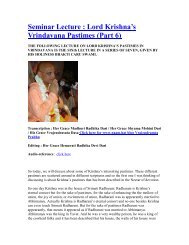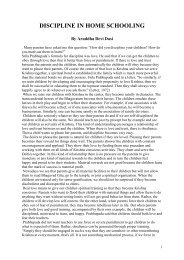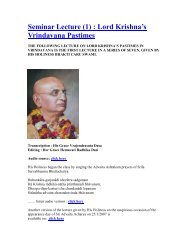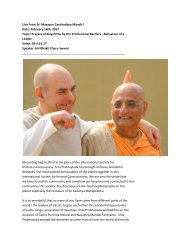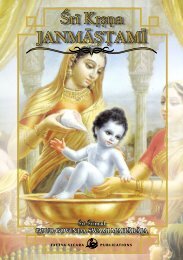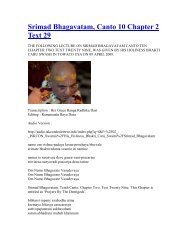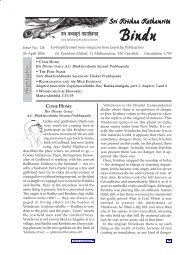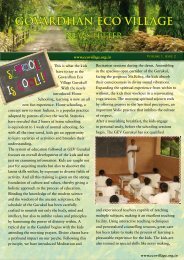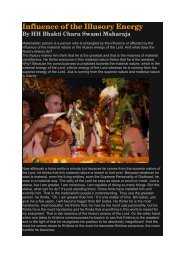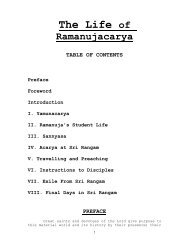Madhusudan Masa - The Eight Petals - ebooks - ISKCON desire tree
Madhusudan Masa - The Eight Petals - ebooks - ISKCON desire tree
Madhusudan Masa - The Eight Petals - ebooks - ISKCON desire tree
Create successful ePaper yourself
Turn your PDF publications into a flip-book with our unique Google optimized e-Paper software.
<strong>Madhusudan</strong> Mas<br />
Volume: 02<br />
Issue: May’10 – June’10<br />
Brahmanda Purana: Leaves, flowers, fruits, water, foodstuff, medicine, and whatever else one eats<br />
should not be taken without being offered to the Lord. If one takes anything without offering it to the<br />
Lord, he is supposed to atone for that. <strong>The</strong>refore, everything must first be offered to Sri Visnu.<br />
When a person is attached to Kåñëa’s lotus feet, he does not eat anything not offered to Kåñëa. CC<br />
Madhya 19.213 purport<br />
<strong>The</strong> vow to eat only krsna-prasada also helps devotees to control the tongue. "Of all the senses, the<br />
tongue is the most difficult to control, but Kåñëa has kindly given us this nice prasäda to help us<br />
control the tongue."<br />
If you lock up, that "I shall not accept anything except prasädam," then if you go on the s<strong>tree</strong>t and if<br />
you see hundreds and thousands of restaurants, you’ll not be allured. ... So automatically it becomes<br />
controlled. SB.<br />
You should take prasada…Otherwise the tongue will dictate, "Give me this kind of food, give me this<br />
kind of food." Krsna-prasada means to control the tongue. Our main enemy is the tongue. In another<br />
place it is said sevon mukhe hi jihvadau svayam eva sphuraty adah. God realization comes by keeping<br />
the tongue engaged in the service of the Lord…So if you do not control your tongue, if you feel<br />
inconvenience in taking prasada, that means you are not making progress. This is the formula. ÇB<br />
6.1.18 Denver, July 1, 1975 (Source: www.salagram.net/sstp-Prasada3.htm)<br />
O<br />
n the spiritual path those that are most inclined to lead a peaceful existence that respects the value<br />
of all life often adopts the vegetarian lifestyle. It is in accordance with the yogic principle<br />
of ahimsa, which is to observe nonviolence and abstain from injuring any being in any way.<br />
However, in the process of bhakti-yoga, devotion goes beyond simple vegetarianism, and food<br />
becomes a method of spiritual progress. In the Krishna temples, food is offered to the Deities in a<br />
special sacrament, after which it becomes prasada or prasadam. This means the mercy of the Lord.<br />
Thus, the food we eat after it is offered to the Lord becomes a means for our purification and spiritual<br />
development.<br />
Devotional service or Krishna consciousness is often described as a process of singing, dancing and<br />
feasting. But the feasting is done with spiritual food, Krishna prasadam. In the Bhagavad-gita Lord<br />
Krishna says, “All that you do, all that you eat, all that you offer and give away, as well as all<br />
austerities that you may perform, should be done as an offering unto Me.” So offering what we eat to<br />
the Lord is an integral part of bhakti-yoga and makes the food blessed with spiritual potencies. <strong>The</strong>n<br />
such food is called prasadam, or the mercy of the Lord.<br />
<strong>The</strong> Lord also describes what He accepts as offerings: “If one offers Me with love and devotion a leaf, a<br />
flower, fruit or water, I will accept it.” Thus, we can see that the Lord does not need anything, but if<br />
one offers fruits, grains, and vegetarian foods, He will accept it. <strong>The</strong> Lord does not accept foods like<br />
meat, fish or eggs, but only those that are pure and naturally available without harming others. So we<br />
Make Vrndavan Villages



